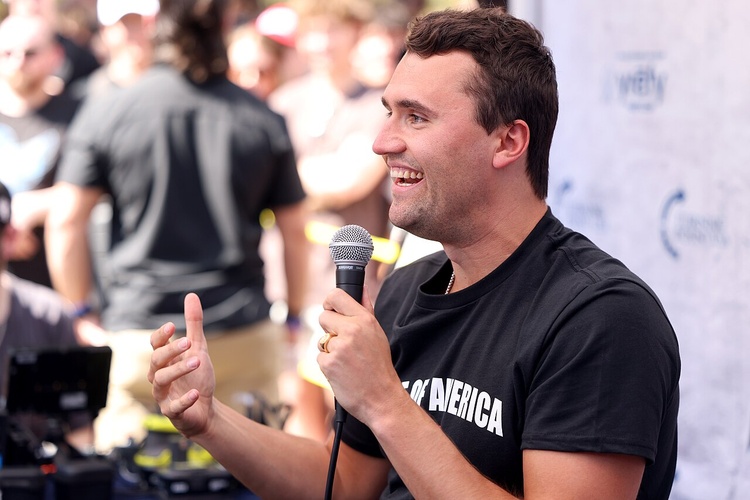Like countless others, I was greatly saddened by the murder of 31-year-old Charlie Kirk, the founder and president of Turning Point USA, a few days ago. My prayers have been with his family and friends and church. Many of us have wept for their pain and suffering, and wept for our country as well.
I am very grateful Charlie expressed a genuine faith in Jesus. Here are a few direct quotes from him.
On his Instagram: “I believe in the Bible, and I believe that Christ rose from the dead on the third day. This is the foundation of my faith and guides my actions.”
In Charisma magazine: “Jesus Christ was God in human flesh. Who first and foremost taught us how to live and secondly and most importantly He was a gift to us; that if we accept Him as our Lord and Savior then we can have eternal life…”
Charlie’s Example of Respectful Disagreement through Dialogue
I want to make clear Charlie Kirk’s murder would have been a great tragedy, and arguably an even greater one, had Charlie not been a Christian (greater because he would not have gone to Jesus when he died). Regardless of his faith, had he been liberal instead of conservative, his assassination would have still been just as much an act of evil. True, in the prolife arena, which every reader of this blog knows is close to my heart, Charlie was a remarkably powerful spokesman to whom I said amen when I heard him talk about abortion. (If you don’t know who Charlie was, see for instance his respectful and logical dialogue with a prochoice young woman.)
I did not know Charlie Kirk personally, never met him, and didn’t listen to him often except in the prolife arena. Occasionally, I would watch clips on other subjects sent to me, and often admired his logic. Sometimes I heard him say something I did not agree with. But so what? Nothing unusual about that—I sometimes disagree with close friends and my spiritual leaders, and they disagree with me. I would've preferred that Charlie sometimes be more critical of our president in certain areas, and thought him doing so would have given him more credibility all those times he agreed with him. But, again, so what?
Charlie Kirk was a good man with earnest beliefs, who defended them with uncommon logic. He was a role model to college students across the country, not just telling them to speak up, but showing them how to speak the truth in love. He was also a brother in Christ, though of course many Christians sometimes disagreed with him, just as many disagree with me. This just comes with the territory, because free speech and open debate are fundamental to who we are as a country. It's one of our greatest strengths.
Charlie Kirk was a proponent of political discourse without the yelling and screaming and name-calling that is not only disturbing, but totally ineffective. I really appreciate that. In both national politics and the leadership of Christian churches and organizations, I believe leaders should be willing to challenge even their own friends and allies when necessary, but again only speaking the truth as they see it in a spirit of love.
In any case, the response to political conflicts should never be violence. Murder is never the answer to someone exercising free speech and publicly sharing their opinions. Murder should be regarded as 100% evil regardless of what areas we might disagree with someone in. I believe in the right to self-defense, yes, but assassination is not self-defense.
None of us is ever going to agree with anyone ALL the time (and if we do, it usually means we are not thinking for ourselves). But I did see clips where Charlie was exceptionally kind to those who openly and aggressively challenged him, which he invited them to do. He believed in open dialogue on points of disagreement, and in being logically consistent, and in not being defensive, and I loved that. (We should listen to those we disagree with because if we don’t, all we will have is dialogues of the deaf.) Charlie made clear to the young that they should love their country despite its flaws, and that they should labor to make it better. He showed them that they could stand up for their beliefs without a hard heart, hatred, and antagonism. That is something that not just the young but the old need to learn. Thank you, Charlie Kirk. And thank you, Jesus.
As followers of Jesus, none of us should blindly follow anyone. We follow King Jesus above all, and that will mean agreeing with some people often, but not always, and disagreeing with others often, but not always. And it means actually listening, then looking for common ground, which I remember Charlie Kirk doing in some of his dialogues I watched. He would say something like, “Let's establish first what we actually agree on.” May we all follow his example in doing this as we communicate both inside and outside our churches, and for that matter in our homes, in our marriages and as we raise our children.
The Death of a National Figure Impacts Us All
When texting with one of my grandsons about Charlie’s death a few hours after he was killed, I told him that I grew up with vivid memories of the assassination of President John F. Kennedy when I was in third grade. I remember where I was standing on a particular staircase at Orient Grade school when I heard the news. I sat with my mom and brother in front of the black and white TV, watching the news coverage for hours that turned into days. Fast forward five years to the spring of my eighth grade year at Orient, when Martin Luther King was assassinated.
Hours after King’s assassination, Bobby Kennedy set aside his prepared campaign speech at a political rally. The microphone caught him asking someone, “Do they know about Martin Luther King?” and when told they didn’t, he started by asking people to lower their signs. Then he said, “I have bad news for you, for all of our fellow citizens, and people who love peace all over the world, and that is that Martin Luther King was shot and killed tonight.”
Loud cries of shock followed, and many in the crowd wept. RFK said nothing political, nothing about his campaign, and spoke impromptu for less than six minutes to a stunned and mourning crowd, because human life is far more important than politics.
Kennedy’s next words were these: “In this difficult day, in this difficult time for the United States, it is perhaps well to ask what kind of a nation we are and what direction we want to move in.” This question applies to us in light of Charlie Kirk’s murder as well. (Kennedy’s entire five-minute speech that day is well worth watching.)
As a fourteen year old who had never heard the gospel and did not know God, I too wept over the murder of Martin Luther King. That spring, before the Oregon primaries, I was involved in Bobby Kennedy’s presidential campaign, going door to door passing out literature. Then, just two months after King was murdered, so was Bobby Kennedy. I was devastated. Bobby Kennedy was to me what Charlie Kirk was and is to many young people across our country, even many who disagreed with him but came to respect him.
As a young teenager who had no spiritual life, my head full of vivid memories of watching hours of the televised killings and related news and the funerals of JFK, MLK, and RFK, I was haunted by a sense of hopelessness. I knew the world was a mess, and in the next few years I would come to realize that I too was a mess, and was prompted to turn to Jesus.
That’s why I am especially sorry for the countless young people, believers and unbelievers alike, who followed Charlie Kirk. Many of them are now feeling exactly what I felt back in those days. You come to believe in and love certain public voices, and when they are killed, it’s like a part of you dies with them.
One of my grandsons, age 19, who appreciated Charlie Kirk, texted me hours after his death:
So awful for his family and our country. This is a dark time, and I pray things don't escalate to more violence. Sobering to know how awful a thing this killing is and yet to know that without Jesus we would all be going to the hell we deserve.
May We Number Our Days
While most people writing about Charlie Kirk’s murder are rightly focusing on the injustice and tragedy, I want to focus on something a bit different: the sobering reminder that none of us are promised we’ll be alive in this world tomorrow. (Because our loving God is in control, this is not fatalism.)
“No man has power over the wind to contain it; so no one has power over the day of his death” (Ecclesiastes 8:8). It is presumptuous to think otherwise. We often live under the illusion that our lives are in our hands. But God’s Word warns us otherwise:
“Now listen, you who say, ‘Today or tomorrow we will go to this or that city, spend a year there, carry on business and make money.’ Why, you do not even know what will happen tomorrow. What is your life? You are a mist that appears for a little while and then vanishes. Instead, you ought to say, ‘If it is the Lord’s will, we will live and do this or that.’ As it is, you boast and brag. All such boasting is evil” (James 4:13-16).
Our life on Earth is brief—“All men are like grass, and all their glory is like the flowers of the field; the grass withers and the flowers fall, but the word of our God stands forever” (Isaiah 40:6-8). Understanding this is the key to being wise rather than foolish. In the oldest psalm, Moses prayed, “Teach us to number our days aright, that we may gain a heart of wisdom” (Psalm 90:12).
It might seem that acknowledging we aren’t in control would raise our level of fear. But that’s not true. Recognizing God’s in control should allow us to relax, resting in His sovereignty. A spirit of fear and timidity is not from God (2 Timothy 1:7).
Corrie ten Boom said, “There are no 'if's' in God's world. And no places that are safer than other places. The center of His will is our only safety—let us pray that we may always know it!”
Our Hope in Jesus Is Unshakeable
In a time of dark suffering and dread, David affirmed,
The LORD is my light and my salvation—whom shall I fear? The LORD is the stronghold of my life—of whom shall I be afraid?... Though an army besiege me, my heart will not fear; though war break out against me, even then will I be confident.... Though my father and mother forsake me, the LORD will receive me.... I will see the goodness of the LORD in the land of the living. Wait for the LORD; be strong and take heart and wait for the LORD. (Psalm 27:1, 3, 10, 13–14)
The hope of God’s people shouldn’t be the illusion that we won’t suffer. Our hope should be in Jesus Christ, and that one day God will end our suffering (Revelation 21:4). Our hope should be in the fact that nothing in this world or outside it—no tragedies or accidents or terrorist attacks or anything else—shall separate us from the love of God in Christ Jesus (Romans 8:38-39).
To many of us, “hope” sounds wishful and tentative, but biblical hope means to anticipate with trust. We expect a sure thing, purchased on the Cross, accomplished and promised by an all-knowing God.
Ten years ago Nanci placed these words from Lamentations 3 on our bedroom wall. I still see them every day:
21Yet this I call to mind
and therefore I have hope:22 Because of the Lord’s great love we are not consumed,
for his compassions never fail.
23 They are new every morning;
great is your faithfulness.
24 I say to myself, “The Lord is my portion;
therefore I will wait for him.”25 The Lord is good to those whose hope is in him,
to the one who seeks him;
26 it is good to wait quietly
for the salvation of the Lord.
Hope points to the light at the end of life’s tunnel. It not only makes the tunnel endurable, it fills the heart with anticipation of a world alive, fresh, beautiful, without pain, suffering, terrorists or war. A world ruled by the only One worthy of ruling (see Revelation 5:12). Though we don’t know exactly when, we do know for sure that either by our deaths or by Christ’s return, our suffering will end. From before the beginning, God drew the line in eternity’s sand to say for His children, “This much and no more, then endless joy.”
In Tolkien’s Return of the King, Aragorn says, “Dawn is ever the hope of men.” King David wrote, “Weeping may last for the night, but a shout of joy comes in the morning” (Psalm 30:5, NASB).
The night may seem long for God’s people, but the truth is this: once it comes, the morning will never end.
Neither will the joy.





